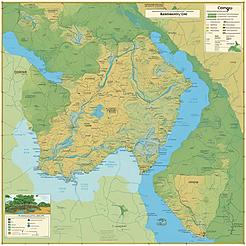
Title: The Importance of Protecting Forest Biomes
Introduction:
Imagine a lush green forest teeming with life - tall trees swaying in the breeze, colorful birds chirping, and diverse animals roaming freely. Forest biomes are not just beautiful landscapes but crucial ecosystems that play a vital role in maintaining the balance of our planet. Let's delve into why it is essential to protect these invaluable forests and the impact of deforestation on climate change.
Why it is Important:
Forest biomes act as the lungs of our planet, absorbing carbon dioxide from the atmosphere and releasing oxygen through the process of photosynthesis. This process helps regulate the Earth's climate by reducing the levels of greenhouse gases that contribute to global warming. Additionally, forests provide habitat for countless species of plants and animals, supporting biodiversity and ecological balance.
Interesting Fact:
Did you know that a single tree can absorb up to 48 pounds of carbon dioxide per year? Trees are nature's carbon sinks, helping to mitigate the effects of climate change by sequestering carbon from the atmosphere.
Real-Life Examples:
1. The Amazon Rainforest: The Amazon Rainforest is the largest tropical rainforest in the world and is home to a staggering array of plant and animal species. The destruction of the Amazon through deforestation not only threatens biodiversity but also releases vast amounts of carbon dioxide into the atmosphere, contributing to climate change.
2. Boreal Forests: The Boreal Forests, also known as the Taiga, span across the northern regions of North America, Europe, and Asia. These forests play a crucial role in regulating the Earth's climate by storing vast amounts of carbon in their soils and vegetation. Deforestation in the boreal forests can disrupt this carbon storage capacity, leading to increased greenhouse gas emissions.
3. Mangrove Forests: Mangrove forests are found along tropical coastlines and provide essential protection against coastal erosion and storm surges. These unique ecosystems sequester carbon at a rate much higher than terrestrial forests and help mitigate the impacts of climate change. Destruction of mangrove forests can result in increased vulnerability to extreme weather events.
Crib Sheet - Key Points:
- Forest biomes are vital for regulating the Earth's climate by sequestering carbon dioxide.
- Deforestation leads to the release of greenhouse gases, contributing to climate change.
- Forests support biodiversity and provide habitat for numerous plant and animal species.
Memorization Technique:
Create an acronym using the first letter of each key point: FBD (Forest Biomes, Deforestation, Biodiversity).
Reflective Questions:
1. Why are forest biomes considered the lungs of the planet?
2. How does deforestation impact climate change and biodiversity?
3. What can individuals do to help protect and preserve forest biomes?
By understanding the importance of protecting forest biomes, we can all contribute to safeguarding these invaluable ecosystems for future generations.




